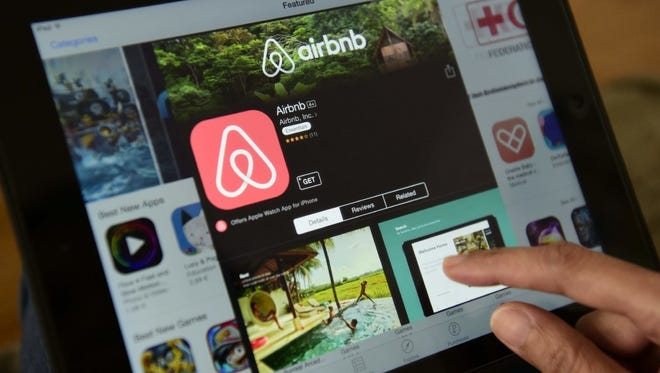Want more affordable housing? Let Arizona cities regulate Airbnb, vacation rentals
Opinion: Senate Bill 1350 prevents cities from regulating short-term rentals by AirBnb and others. Nixing it would help ease the affordable housing shortage.
Tim Robustelli and Maresa Strano

As COVID-19 continues to ravage the country, housing advocates are racing to protect as many as half a million Arizonans from eviction and foreclosure. And yet, as local governments scramble to increase affordable housing options, they are being blocked by the state from implementing an obvious fix: regulating Airbnb and other short-term vacation rentals.
Short-term rentals have been a hot topic ever since 2016, when Gov. Doug Ducey signed Senate Bill 1350, permitting short-term rentals to operate in Arizona and preempting municipalities from governing the industry.
Communities in Maricopa County and elsewhere vocally opposed the bill. Residents, notably in Scottsdale and Paradise Valley, have long criticized the rowdy weekend atmosphere created by these rentals.
But parties were far from residents’ chief concern. In a county that only has 20 affordable homes for every 100 renter households, short-term rentals are removing housing stock from the real estate market and driving up rent.
Investors flip complexes into weekend rentals
Phoenix, Scottsdale, Tempe and Mesa contained more than 8,200 active short-term listings at the time of writing, according to the data analytics firm AirDNA, and investors are known to flip entire apartment complexes into weekend rentals, removing desperately needed affordable housing options.
Maricopa County’s affordable housing crunch has contributed to an eviction and foreclosure crisis that resulted in at least 46,000 families being put out on the street in 2018, according to New America, a D.C. think tank.
The economic crisis resulting from COVID-19 means that a quarter of Arizona adults expect someone in their household to have a loss in employment income in the next four weeks, and will likely push hundreds of thousands of new families into housing insecurity.
Arizona prevents cities from making rules
And yet, as local governments in the Valley of the Sun scramble to stabilize families and increase affordable housing options, they are being blocked by the state Legislature from implementing already identified remedies like regulating short-term vacation rentals. This type of state-level choke — in this case via SB 1350 — is called preemption, and it’s a national problem.
Preemption occurs when a higher level of government limits or removes a lower government’s authority to legislate on a certain issue. Recent history has shown that it’s difficult to counter preemption laws, but not impossible.
Arizona voters proved that in 2016 with Proposition 206, a ballot initiative that trumped the state’s preemption of local minimum wage and guaranteed paid sick days for workers.Get the Opinions Newsletter newsletter in your inbox.
Our best and latest in commentary in daily digest form.Delivery: Mon-FriYour Email
A broad coalition can defeat preemption
Elsewhere, just last year Colorado repealed its preemption of local minimum wage ordinances, the first in the country to do so. The repeal campaign took just two sessions to succeed. Why? Experts close to the effort identified key strategies that helped clinch the preemption win, including building a diverse coalition of support and picking a sponsor willing to work with experts.
Both can apply to the fight against SB 1350. The Arizona Housing Coalition is a great place to start, with its vast and varied membership of city governments, unions, banks and nonprofits. To add fuel, the hotel industry is a natural ally in the fight to rein in short-term rentals, as home-sharing platforms — with their ability to skirt zoning laws and certain taxes — have been a thorn in the hotel industry’s side.
Business owners and community leaders, upset about the dwindling stock of homes available to private and public workers, could be powerful allies in the pressure campaign as well. Advocates working to ditch the state’s preemption of local rent control and inclusionary zoning ordinances can also be enlisted as partners on conditions of reciprocity.
Other ways to undo SB 1350
Arizonans for Fair Wages and Healthy Families, the organization behind Proposition 206, might also be willing to lend material or strategic support.
A number of Arizona lawmakers have already sponsored bills to address SB 1350. If reelected, one of them could coordinate with in-state and national housing and legal experts to craft a bill that’s sensitive to Arizona’s politics and home rule laws, and to offer guidance on effective short-term rental policies.
If all else fails, there remains the option of citizen initiative. Arizona does not (yet) have signature distribution requirements for initiatives, which means a measure to address SB 1350 could qualify on the strength of its support in a few Valley neighborhoods alone. After that, a majority of “yes” votes statewide is needed to approve the measure, but again, far from impossible.
The pandemic has exacerbated Arizona’s affordable housing crisis, not just for the poorest residents, but for the middle class. While SB 1350 is not solely at fault for Arizona’s housing woes, unshackling municipal authority over short-term rentals is a realistic first step toward creating and preserving affordable housing at a critical time.Story from Cox BusinessBike shop shifts gears with telecom provider for better serviceHub City Cycles flourishes as a community-driven bike shop with a reliable telecommunications provider.See More →
Tim Robustelli and Maresa Strano are policy analysts with the Future of Property Rights and Political Reform programs of New America, a left-of-center think tank based in Washington D.C. that studies a broad range of public policy issues. Reach them at robustelli@newamerica.org and strano@newamerica.org.


